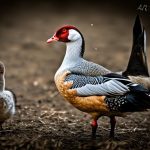Geese are social animals that thrive in the company of their flock. They are highly territorial and protective of their nesting sites, making them excellent guard animals. Geese are also known for their strong homing instincts, which can make them prone to wandering if not properly contained. Understanding the natural behavior of geese is crucial for creating a safe and secure environment for them. Geese communicate through honking and body language, and they are highly attuned to their surroundings. They are also known for their strong bond with their mate and offspring, making them loyal and protective parents. Geese are also known for their intelligence and problem-solving abilities, which can make them adept at finding ways to escape if they feel threatened or stressed. Overall, understanding the behavior of geese is essential for providing them with a safe and comfortable living environment.
Geese are also known for their migratory instincts, which can influence their behavior in captivity. They are naturally inclined to forage for food and explore their surroundings, making it important to provide them with ample space to roam. Geese are also known for their strong attachment to their nesting sites, which can make them resistant to change. Understanding the natural behavior of geese can help you anticipate their needs and address any potential stressors in their environment. Geese are also known for their strong sense of hierarchy within the flock, which can influence their social dynamics. Understanding the behavior of geese can help you create a harmonious living environment for them, where they feel secure and content. By understanding the natural behavior of geese, you can better meet their needs and ensure their well-being in captivity.
Key Takeaways
- Geese are social animals that exhibit strong flocking behavior and can become stressed when isolated.
- A secure enclosure for geese should include fencing that is at least 3 feet high and buried underground to prevent digging.
- Training and socialization techniques for geese should involve positive reinforcement and regular interaction with humans.
- Potential stressors for geese include loud noises, overcrowding, and sudden changes in their environment.
- Deterrents such as motion-activated sprinklers and predator decoys can help prevent geese from escaping.
- Seeking professional advice and assistance from a veterinarian or animal behaviorist can help address any issues with your geese.
- Regularly reevaluating your geese’s living environment and routine can help ensure their well-being and happiness.
Creating a secure enclosure for your geese
Creating a secure enclosure for your geese is essential for their safety and well-being. Geese are known for their strong homing instincts and territorial nature, making it important to provide them with a secure space where they can roam freely without the risk of escaping. When designing an enclosure for your geese, it’s important to consider their need for space to forage and explore. A fenced-in area with access to water and shelter is ideal for providing geese with a secure living environment. The fencing should be tall enough to prevent them from flying over and sturdy enough to withstand their natural inclination to explore and test boundaries.
In addition to fencing, providing your geese with a sheltered area where they can rest and seek refuge is important for creating a secure enclosure. Geese are sensitive to changes in their environment and can become stressed if they feel exposed or vulnerable. Providing them with a sheltered area where they can retreat from the elements and potential predators is essential for their well-being. It’s also important to regularly inspect the enclosure for any potential escape routes or weak spots in the fencing. By creating a secure enclosure for your geese, you can provide them with a safe and comfortable living environment where they can thrive.
Implementing training and socialization techniques
Implementing training and socialization techniques is essential for managing the behavior of your geese and ensuring their well-being in captivity. Geese are intelligent animals that respond well to positive reinforcement and consistent training. By establishing a routine and using rewards to encourage desired behaviors, you can help your geese adapt to their living environment and develop a strong bond with you as their caretaker. Training your geese to come when called, stay within designated areas, and interact calmly with humans can help prevent potential escape attempts and reduce stress for both the geese and their caretakers.
Socialization is also important for managing the behavior of geese in captivity. Introducing new geese to an existing flock or acclimating them to other animals on the property should be done gradually to prevent conflicts and reduce stress. Geese thrive in the company of their flock and benefit from social interactions with other animals. By providing opportunities for socialization, you can help your geese feel more secure and content in their living environment. Implementing training and socialization techniques is essential for managing the behavior of geese in captivity and ensuring their well-being.
Identifying and addressing potential stressors for your geese
Identifying and addressing potential stressors for your geese is crucial for maintaining their well-being in captivity. Geese are sensitive animals that can become stressed by changes in their environment, interactions with other animals, or disruptions to their routine. Common stressors for geese include loud noises, unfamiliar animals or people, overcrowding, and inadequate access to food and water. By observing your geese closely and monitoring their behavior, you can identify potential stressors and take steps to address them.
Providing your geese with a consistent routine, access to fresh water and nutritious food, and a secure living environment can help reduce potential stressors. It’s also important to minimize exposure to loud noises or sudden movements that can startle or agitate your geese. If introducing new animals or caretakers to the property, it’s important to do so gradually to prevent conflicts and reduce stress for your geese. By identifying and addressing potential stressors, you can help your geese feel more secure and content in their living environment.
Utilizing deterrents to prevent escape
Utilizing deterrents to prevent escape is essential for maintaining the security of your geese’s living environment. Geese are naturally curious animals that may be inclined to explore beyond the boundaries of their enclosure if they perceive an opportunity to do so. By implementing deterrents such as motion-activated alarms, visual barriers, or predator decoys, you can discourage your geese from attempting to escape. It’s also important to regularly inspect the fencing and enclosure for any potential weak spots or escape routes that need to be addressed.
In addition to physical deterrents, providing your geese with ample space to roam and explore within their enclosure can help reduce the likelihood of escape attempts. By meeting their natural need for space and stimulation, you can help prevent boredom and restlessness that may lead to escape attempts. Utilizing deterrents to prevent escape is essential for maintaining the security of your geese’s living environment and ensuring their well-being in captivity.
Seeking professional advice and assistance

Seeking professional advice and assistance is important for addressing any behavioral or security concerns related to your geese’s living environment. Consulting with a veterinarian or animal behaviorist can provide valuable insights into managing the behavior of your geese and addressing any potential stressors they may be experiencing. A professional can also offer guidance on creating a secure enclosure that meets the specific needs of your geese and prevents escape.
In addition to seeking professional advice, connecting with other experienced goose owners or joining online forums or community groups can provide valuable support and resources for managing the behavior of your geese. By seeking professional advice and assistance, you can gain valuable insights into creating a secure living environment for your geese and addressing any behavioral concerns they may have.
Reevaluating your geese’s living environment and routine
Reevaluating your geese’s living environment and routine is important for ensuring that they have a secure and comfortable place to thrive. Regularly assessing the condition of the enclosure, inspecting the fencing for any potential weak spots, and monitoring the behavior of your geese can help identify any areas that need improvement. It’s also important to consider any changes in the surrounding environment that may impact the security or well-being of your geese.
In addition to reevaluating the physical environment, assessing the daily routine of your geese can help identify any potential stressors or areas for improvement. Providing a consistent routine that includes regular access to food, water, social interaction, and opportunities for exercise can help reduce stress and prevent escape attempts. By reevaluating your geese’s living environment and routine, you can ensure that they have a secure and comfortable place to thrive in captivity.
If you’re struggling to keep your geese from running away, it might be worth considering the design and size of their coop. A well-designed coop can help prevent escape attempts and keep your geese safe and secure. For helpful tips on coop design and size, check out this informative article on PoultryWizard. Understanding the importance of coop dimensions and layout can make a significant difference in managing your geese and ensuring they stay where they belong.
FAQs
Why do geese run away?
Geese may run away due to fear, stress, or a desire to explore their surroundings. They are naturally curious and may wander off if they feel confined or if they are seeking food or water.
How can I prevent my geese from running away?
To prevent geese from running away, ensure that their enclosure is secure and provides enough space for them to roam. Additionally, providing them with plenty of food, water, and enrichment can help keep them content and less likely to wander off.
What should I do if my geese run away?
If your geese run away, try to locate them by searching nearby areas. You can also try using food or familiar calls to attract them back. If they do not return, consider asking neighbors or local animal shelters if they have seen your geese.
Are there any legal implications if my geese run away?
In some areas, there may be local ordinances or regulations regarding the ownership and containment of geese. It’s important to familiarize yourself with any relevant laws and regulations to ensure that you are in compliance if your geese do run away.
Meet Walter, the feathered-friend fanatic of Florida! Nestled in the sunshine state, Walter struts through life with his feathered companions, clucking his way to happiness. With a coop that’s fancier than a five-star hotel, he’s the Don Juan of the chicken world. When he’s not teaching his hens to do the cha-cha, you’ll find him in a heated debate with his prized rooster, Sir Clucks-a-Lot. Walter’s poultry passion is no yolk; he’s the sunny-side-up guy you never knew you needed in your flock of friends!







